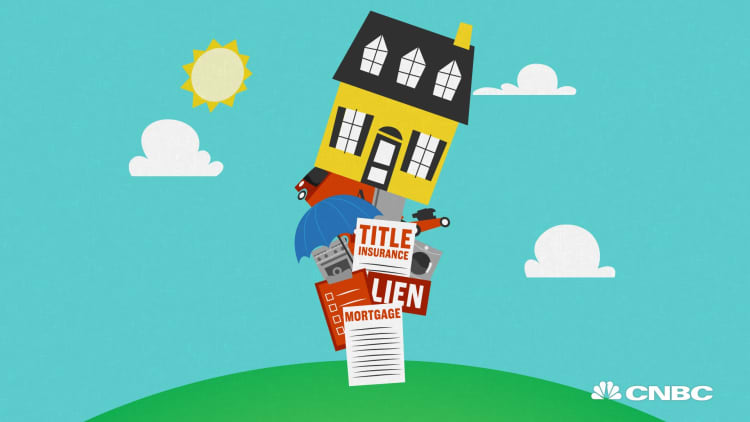
Homeownership may be the stuff of American dreams, but it doesn't come cheap. Even a reasonably priced home will end up costing many more times the initial amount. In addition to the mortgage, there's interest, taxes, insurance and upkeep. And that's before any renovations you might want to make.
For many, homeownership may not make financial sense, said Laura Walton, executive director of the TCI Foundation, a nonprofit that provides financial literacy education to young adults.
"The idea of homeownership is so ingrained in our culture," she said. "But not everyone should own a home."
Before diving into homeownership, decide if you can handle all the costs involved.
The expenses start piling up the moment you say "I do" to a home. If you plan to take out a mortgage, have a good chunk of cash already in your bank account. In addition to your down payment, banks want to see some financial cushion so they'll have confidence in your ability to pay the mortgage.
"Expect to have the bank up in your business during the home-buying process," explained Katie Brewer, a certified financial planner and founder of Your Richest Life.
A 20 percent down payment is the gold standard for a mortgage, said Linda Rheinberger, a broker with Berkshire Hathaway Home Services in Las Vegas and regional vice president of the National Association of Realtors. That way, you'll get a lower interest rate and won't need to carry private mortgage insurance.
More from FA Playbook:
Advisor calms clients after Trump win
6 ways Trump will affect your wallet
The potential market impact of Donald Trump in the White House
But you can still get a mortgage for less than that much down. Veterans, for example, can even score a mortgage for no money down if they have good credit and go through the U.S. Department of Veterans Affairs.
Once the home-buying process gets under way, buyers should be prepared to pay for a number of other costs, such as an inspection, title search, appraisal, survey and origination fees, to name a few. Some of these costs can be rolled up into the loan, but that will result in higher payments. You may be able to negotiate down the loan origination fee.
In total, Rheinberger cautioned, buyers should expect to pay 2 percent to 5 percent of a home's sales price in fees before they're ever given the keys to their kingdom.
Moving time
The expenses, of course, don't end at closing.
Unless you have a couple of college buddies with strong backs, expect to shell out a couple thousand dollars for movers. Obviously, long-distance moves cost more.
Moving within 20 miles will probably cost $1,000 or so. A cross-country relocation could cost upward of $5,000. For that reason, it pays to think carefully about what you're putting into the moving truck.
"If you're moving out of state, try to get rid of or sell as much personal property as possible," said Rheinberger.
Expect to have the bank up in your business during the home-buying process.Katie Brewerfounder of Your Richest Life
It might cost more to move furniture long distance than it will be to buy replacements in your new location. On the other hand, a big house needs lots of furnishings.
"If you're used to a one-bedroom apartment and then you go to a three- or four-bedroom house, you're going to need a lot more furniture," said Brad Hunter, chief economist with HomeAdvisor, which estimates the most common costs of homeownership.
While some sellers leave behind major appliances such as a stove or dishwasher, you may need to provide a refrigerator and washer and dryer. Even low-end models can cost $1,000 or more.
And don't forget the little things, added CFP Joe Pitzl, managing partner with Pitzl Financial. "When you walk into a house, there are no brooms or mops or vacuums," he said. "There's an endless number of things that come up along the way that eat into your cash flow."
Expect the unexpected
After the expense of moving, you are not free and clear. Just about anything can go wrong in a home, and homeowner's insurance may not cover it.
Take it from financial planner Brewer of Your Richest Life. About a year after she and her husband moved into their Dallas home, they discovered a tree root encroaching on a sewer line. "It didn't come up in the inspection, and the insurance wouldn't cover it because it wasn't technically in the house," she said.
Removing the tree root set them back $2,000, an expense they never anticipated. The moral of the lesson, said Brewer, is, "Don't go into homeownership if you don't have an emergency fund, because things come up all the time."
While Brewer's repair came out of the blue, others may be more predictable, and you have be realistic about what you're getting yourself into, said Craig McClelland, chief operating officer with Better Homes and Gardens Real Estate Metro Brokers in Atlanta.
"If you have a 16-year-old house, that means you probably have a 16-year-old [heating, ventilation and air-conditioning] system," he said. "The inspector may not explain that there is a $15,000 bill sitting right there."
According to a recent study by HomeAdvisor, within the first year of homeownership, 46 percent of owners spent more on projects than they had anticipated, and 57 percent encountered unexpected projects.
"Coming from a culture of renting, you don't realize the cost of even minor repairs," said Walton of the TCI Foundation.
Consider this: Repairing a furnace can go as high as $800. Replacing gutters and downspouts costs as much as $9,000, according to HomeAdvisor.
But delaying home repairs can have worse long-term consequences. Homeowners should plan on spending an average of 1 percent to 2 percent of the sale price each year on maintenance. If your home costs $300,000, that means $3,000 to $6,000, though you might not spend that much every single year.
Homeownership can be rewarding as long as you're realistic about how much it will cost you.
— By Ilana Polyak, special to CNBC.com




